

IMPACT REPORT
Cover image: Charity Irene — Batwa Beekeeper, Uganda.
A LETTER FROM THE CHAIR AND CEO
We are delighted to introduce our 2024 Impact Report — the first together as Chair of Trustees and CEO of Bees for Development.
This has been a year of transformation. We are proud to report not only tangible progress on the ground but also a successful transition in leadership. After 30 years of extraordinary vision and commitment, our founder, Dr Nicola Bradbear, stepped down as CEO. Nicola’s legacy is profound: she built an organisation that has touched thousands of lives, influenced global policy, and demonstrated that beekeeping is a powerful, practical route out of poverty. It is a great honour to carry this legacy forward, and we thank Nicola for everything she has contributed.
With new leadership has come renewed ambition. Over the past year, Bees for Development has grown in reach and impact. The success of the Honey and Beeswax Trade Centre in Ghana stands out as a milestone achievement. This Centre is already functioning as a vibrant hub — supporting enterprise, processing, training and innovation. This year, it bought 11 tonnes of honey and beeswax from beekeepers in Afram Plains, an incredible achievement after only two years of operation.
We also marked a new chapter in our global reach. In 2024, Bees for Development began speaking to Amazon Research Internacional about starting working with them in Peru. Together, we will be supporting Indigenous communities in Peru who keep stingless bees, a culturally significant and ecologically vital practice. This project not only expands our footprint but also deepens our commitment to beekeeping as a tool for both biodiversity conservation and livelihood resilience.
Our work is driven by a simple idea: bees can help people live better lives in harmony with nature. By promoting nature-based, community-led beekeeping, we create income for marginalised groups while encouraging the protection of biodiversity and pollinators. As people learn to value their bees, they become champions for conservation, restoring land, sharing knowledge, and fostering social cohesion, inclusive growth, and environmental stewardship. This demonstrates how interconnected solutions can address climate change, biodiversity loss, and poverty.
In this Impact Report, we share how our women’s beekeeping group in Zimbabwe has planted thousands of trees, how new Buzz Clubs have sprung up across Ghana, and how we train new beekeepers and support them as their apiaries grow. We also highlight our work with farmers in Ethiopia to reduce pesticide use — protecting their bees while boosting crop yields.
This year has also reinforced the importance of listening. As we grow, we are determined to remain grounded in the voices and needs of those we serve. In 2025, we will host our first Global Strategy Summit,
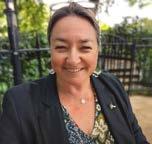
Hannah Wood CEO
bringing together partners and practitioners from across Africa, Asia, and Latin America. This will be more than a planning session; it will be a space for open dialogue, co-creation, and shared vision. We want those who implement and benefit from our work to shape our future. It is their experience, insight and leadership that will guide us forward.
We enter this next chapter with confidence. The progress made over the past year gives us a strong foundation: new partnerships, growing impact, and a renewed sense of purpose. But we also know the work ahead remains urgent. Around the world, millions still face poverty, environmental degradation, and lost opportunity. Bees for Development exists to offer a different way — where livelihoods are built on sustainability, where biodiversity is valued and where communities lead their own development journeys.
Thank you for being part of this mission. Whether you support us as a partner, donor, policymaker or beekeeper, your contribution matters. Together, we are showing what is possible when people and nature thrive side by side — with bees at the centre.

Suzie Shaw Chair of Trustees
2024 YEAR IN REVIEW
As I reflect on our work and impact, I’m reminded that Bees for Development is as much a learning organisation as it is a doing one. We are constantly evolving, guided by the bees, and inspired by the resourcefulness and resilience of the people we work with around the world.
Bees teach us to collaborate, adapt, and build sustainable systems — values that as an organisation we carry through everything we do. And just like a thriving hive, our global community of supporters, beekeepers, partners, and friends makes this work not only possible, but powerful.
In 2024, we took meaningful steps forward. We reached more people, planted more trees, protected more bees, and shared more knowledge. We celebrated major campaign successes, grew our educational programmes, and continued to advocate for the role of bees in addressing some of the world’s most pressing challenges from climate change to poverty.
In 2024, our Big Give Green Match campaign fundraised to support 100 women beekeepers in Zimbabwe, helping them plant 15,000 trees, set up thriving apiaries, and protect 20 hectares of Miombo woodland. Later in the year, our Big Give Christmas Challenge supported our work training farmers in Ethiopia to farm without harmful pesticides, safeguarding both pollinators and livelihoods. Our educational programmes also reached new heights. In Ghana, we trained 13 teachers and launched 6 new Buzz Clubs in primary schools, introducing young students to the power of bees and biodiversity. And closer to home, every primary school in Monmouthshire received our World Bee Day learning pack, helping inspire the next generation of bee champions.
In May, we were delighted to return to the RHS Chelsea Flower Show, where our award-winning pollinator garden highlighted how beekeeping supports all 17 UN Sustainable Development Goals. Throughout the year, our team could be found at events across the country, from the Monmouth Bee Festival to national talks and community celebrations, raising awareness and sharing stories of our impactful work. Through every donation, campaign, and conversation, you have helped drive this change.
We also reached new audiences through our BBC Radio 4 Appeal, beautifully presented by our Patron Monty Don. The appeal brought fresh attention to our ‘Pollinate Change’ programme in Ethiopia, supporting farmers in the Amhara region to protect their bees, reduce pesticide use, and restore balance with nature.
There is always more to do, but also so much to be proud of. Thank you for being part of this journey, whether you gave, volunteered, fundraised, or simply shared our message. Your support is truly making life better with bees.

Jenny Handley Head of Comms and Fundraising

sdgs.un.org/goals

2024 HIGHLIGHTS
2024 was a busy and productive year at Bees for Development and we've selected six of our favourite highlights of the year to share with you.

After spending the summer training teachers, we launched six new Buzz Clubs in schools around Donkorkrom, Ghana. This whole project would not have been possible without the generous donations from our supporters as part of our Buzz Club campaign in September.
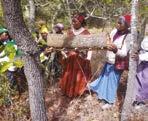
NEW WOMEN’S BEEKEEPING GROUP IN ZIMBABWE
For our Green Match campaign in April, we fundraised to support our partner Working for Bees in Zimbabwe to launch a new women’s beekeeping group and establish a tree nursery. The group is now up and running and has an apiary on some donated land. They have also set up a tree nursery, collected and sown seeds and planted the seedlings, focussing especially on bee-friendly trees.
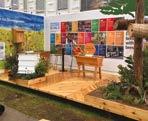
We were delighted to win a silver gilt award at the Chelsea Flower Show in May. With planting inspired by our work both in the UK and internationally, our stand celebrated all insect pollinators, especially the honey bee, and its vital role in improving the lives of people in the poorest nations. We displayed bee hives from around the world and showed how amazingly beekeeping can address all 17 of the UN Sustainable Development Goals.
HOSTED THE INAUGURAL MALAWI NATIONAL HONEY SHOW

In 2024, we started new work in Malawi, offering practical beekeeping training to forestry students at Mzuzu University, and helping the Malawi Bee Products Association to host the first National Honey Show. These initiatives have fuelled demand for further support, in a country where 70% of people live in poverty.
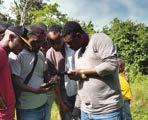
LAUNCHED OUR HONEY TRACEABILITY SYSTEM IN ETHIOPIA
We have been developing a traceability and quality assurance system and in 2024 we launched it with our partners at Bees for Development Ethiopia. The system assists beekeepers in proving the provenance of their unique products, ensuring honey quality, and giving buyers the confidence to know that should an issue arise, it can be traced back to source and corrected.
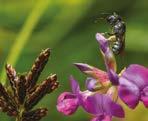
FARMERS REDUCE PESTICIDE USE TO SAVE BEES
The 2024 results of our Farmer Fields Schools in Ethiopia, showed that by adopting Integrated Pest Management on Grass Pea, farmers reduced the use of Highly Hazardous Pesticides from 8.7 applications to zero. Farmers still achieved satisfactory yields and by spending less on chemical sprays they increased their profit by 130% — and saved bees!
SIX NEW BUZZ CLUBS IN GHANA
WON SILVER GILT AT THE CHELSEA FLOWER SHOW
PROJ EC T EXPENDITUR E 23/24
UK 1 project
£20,000
Sierra Leone
1 new project started May 2024
Ghana 5 projects
£194,302
Peru
New project in development
Start date April 2025
Ethiopia 5 projects
£308,248
Uganda 4 projects
£171,804
Malawi
2 new projects started September 2024
Zimbabwe 1 project
£9,975
India 1 project
£2,611
OUR IMPACT
BEEKEEPING TRAINING
At the heart of our work is naturebased beekeeping training. Working within communities, we teach people how to make local style beehives and establish apiaries. We show them how to encourage bees to colonise the hives and give them the skills and confidence to harvest high-quality honey and beeswax.
Success in beekeeping depends on deep local knowledge: understanding when bees swarm, when flowers produce nectar and pollen, and the optimal times for harvesting. This is why we always work with local trainers, who teach regionally appropriate, sustainable beekeeping methods.
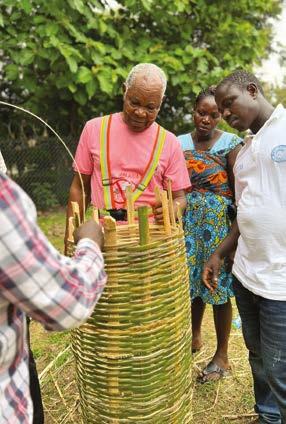
BEEKEEPER TRAINING SESSIONS
In our training sessions, we teach local style hive making which involves using freely available natural materials, for example bark, logs, bamboo and grasses which are abundant in many tropical and sub-tropical nations where we work.
Evidence from honey producing regions in developing nations shows that where hives are cheapest, total honey harvests are highest because the barrier to participation is low, allowing more people to derive a sustainable harvest from their natural resources — trees and bees!
IN 2024 WE TRAINED 1,074 BEEKEEPERS ACROSS 6 COUNTRIES
Beekeeping training course participants learning to weave a basket hive in Ghana
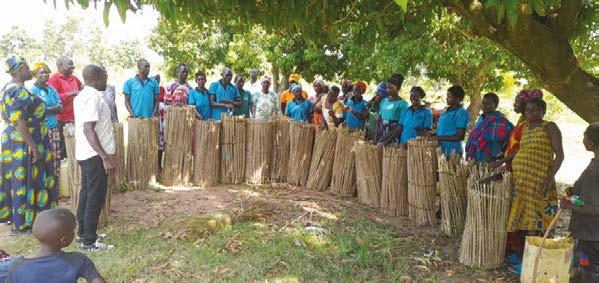
BEEKEEPING SUPPORT
Our work doesn’t end when the training workshop does. We know that learning beekeeping is an ongoing process. Our Beekeeping Extension Agents regularly check in with new beekeepers, to troubleshoot and assist. We facilitate lead beekeepers to take on the role of community-based mentors — so experience and skills are shared within the community.
IN 2024, OUR BEEKEEPING EXTENSION AGENTS IN GHANA SUPPORTED 212 NEW BEEKEEPERS IN 15 COMMUNITIES.
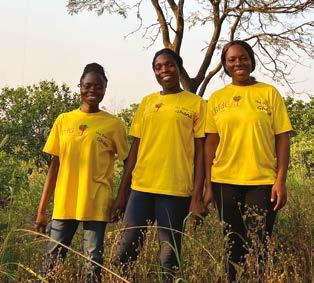
APIARY SET-UP
We always provide context-specific advice about apiary establishment. In some cases forest locations are best, elsewhere people prefer to site hives near their homes for security and easy access.
Unfortunately not everyone has access to land. In Uganda we helped the Batwa people negotiate with local landowners about hive siting. Farmers gain from pollination services, landowners from forest protection, and beekeepers space for their hives. In Zimbabwe, with the help of partner Working for Bees our group of newly trained women were granted access for beekeeping, to 150 hectares of forest by the local District Council, in exchange for forest enrichment and care.
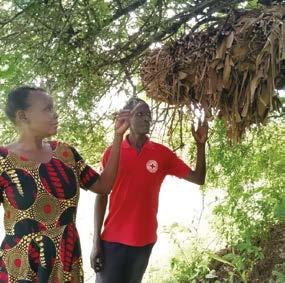
A productive fixed comb hive making workshop in Uganda
Apiary establishment training in Ghana
Beekeeping Extension Agents in Ghana — Clara, Florence and Rejoice.
OUR IMPACT
MARGINALISED GROUPS
Economic empowerment for women, marginalised groups, and people living with disabilities is a high priority for us. We are committed to breaking down the barriers that prevent these groups from earning a sustainable income through beekeeping.
Whether it's installing guide ropes through apiaries for visually impaired beekeepers or designing lower hive stands for women, our team is dedicated to making beekeeping accessible to all.
WOMEN
Uganda
In 2024, The Uganda National Apiculture Development Organisation (TUNADO) and Bees for Development worked with 102 women in Northern Uganda. TUNADO trained the women to make bee hives and to harvest and process honey.
The beekeepers were also connected to Jephina Honey, a woman owned honey enterprise. In 2024, the 102 women beekeepers harvested and sold 2,042kgs of honey, worth approximately £4,370, an average of £42 each. This is significant in a country where the average cash income for farmers is £700 a year.
In May 2024 we began a new project with 150 women, 17 with a disability, in Soroti district of Uganda.
Zimbabwe
Starting in 2023, 100 women over three areas have been taught how to construct bee hives, with 100 hives now occupied. To further support this work by Working for Bees, our 2024 Big Give Green Match campaign raised funds to establish a tree nursery. Now complete, the nursery is providing tree seedlings and jobs to the local community.
INDIGENOUS COMMUNITIES
Uganda
The Batwa people of Kisoro District in Uganda face many challenges having been forcibly removed from their ancestral forests. Learning beekeeping has become a life-changing opportunity for them as they gain independent income and respect from their neighbouring communities, whilst protecting the forests that house and feed their bees.
“I saw from friends, when they would harvest, they would have honey to give to their sick children. They would also sell and get money to feed their family”
Charity Irene, Batwa community member
48 members of the Batwa community (18 women, 30 men) have been trained in how to make their own hives. The average number of hives made by new beekeepers in 2024 is six.
New partnerships have been created between Batwa beekeepers and landowners — so beekeepers have somewhere to site hives and collect hive making materials. In 2024, 19 landowners expressed interest in partnering with Batwa beekeepers.
TRAINED 48 MEMBERS OF THE BATWA COMMUNITY
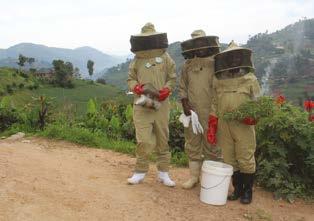
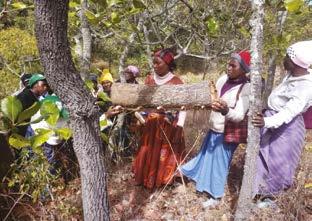
Batwa beekeepers in the Kisoro district of Uganda
Nyazura Women's Group beekeepers in Zimbabwe
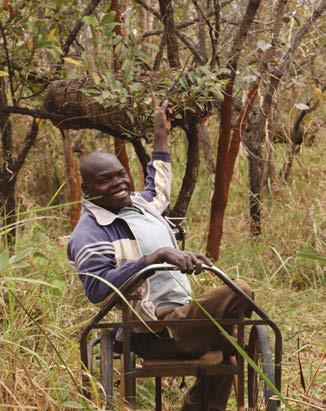
PEOPLE WITH DISABILITIES
Uganda
We have been working at the Mbale Secondary and Vocational School for the Deaf, giving students skills needed to join the beekeeping industry, and earn income. Tailoring students have learned how to make bee suits, carpentry students — top-bar hives and welding students have been making smokers.
There is a demand for beekeeping supplies — protective equipment, bee hives, and smokers in Uganda. Training youth to make equipment allows them to reach this market and gives them a competitive advantage. In addition, they can set themselves up with all they need to start their own beekeeping enterprise.
One student mentioned the importance of these new skills:
“This equipment is not common compared to other skills we learn as part of the syllabus. Everywhere carpenters, tailors and welders compete because everyone is making the same things which makes business not profitable. With these new skills we shall make good money.”
In Uganda, 70 youth — 30 with disability — received beekeeping, hive making, and bee suit making training.
Mbale Secondary and Vocational School won a contract from a local business to make 20 top-bar hives and earned UGX 1,600,000 (c.£350).
BEE CHAMPIONS
Uganda
We supported three disability inclusion workshops for Bee Champions and group leaders, to impart a positive attitude and mind-set change towards disability inclusion. All groups will now include and support at least two people with disabilities.
Beekeeper training has now been provided to 118 people with disabilities and Bee Champions supported them to increase hives to a minimum of ten. 3.5 tonnes of honey was harvested across all project locations.
Beekeepers have since reported increased demand for their honey due to the good quality. The market is growing with buyers approaching TUNADO looking for honey, wax and other products.
101 farmers produced 6,661 kg worth £11,365 or £112 per beekeeper.
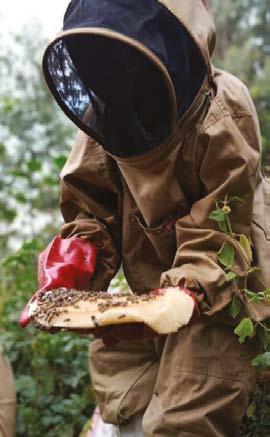
Jacob has a physical disability and requires a hand powered bicycle to move around. He was trained by TUNADO and now has 13 honey bee colonies.
A Batwa beekeeper harvesting honey in Uganda.
OUR IMPACT
EDUCATION
Our work in schools is the perfect complement to our work in the community — empowering students to take their knowledge home and educate their families about bees and beekeeping. At university level, students gain a solid foundation in apiculture and enterprise development, equipping them for careers in the sector and preparing them to become future leaders.
BUZZ CLUBS
Ghana
Buzz Clubs offer the opportunity for school children in Ghana to learn about bees and other pollinators, the role of bees in food production, and biodiversity conservation. The children also learn the craft of beekeeping to produce honey and other hive products, as well as developing their entrepreneurial skills at this young age.
In 2024, 13 schoolteachers took part in five days of intensive training to teach these clubs. They were equipped with the skills necessary to teach sustainable beekeeping with hands on sessions on local-style hive making, lighting of smokers and apiary establishment and management. There are currently 16 Buzz Clubs in Ghana with 330 students attending.
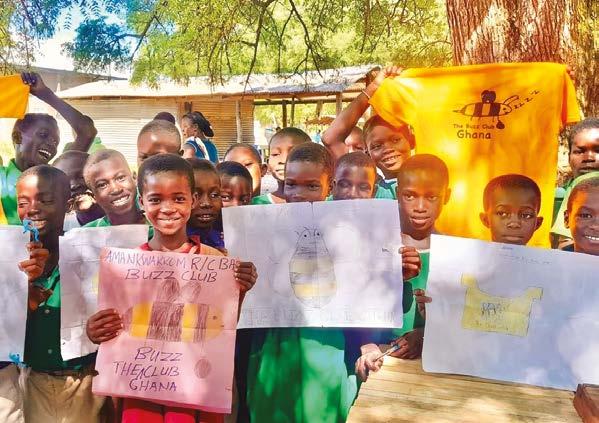
330 STUDENTS ATTENDING
BUZZ CLUBS IN GHANA
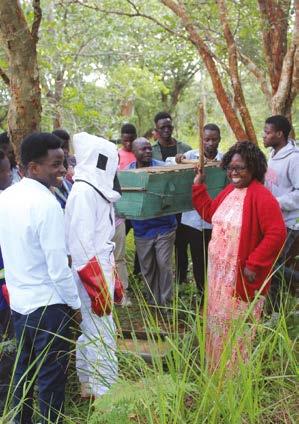
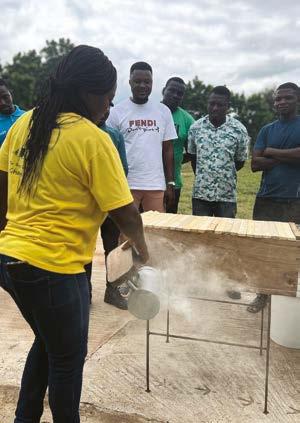
EDUCATING APICULTURE LEADERS FOR THE FUTURE
Malawi
We are partnering with Mzuzu University, to enhance apiculture education by ensuring forestry students benefit from practical training, alongside the theory. By providing hands on training, we ensure students have essential beekeeping skills. We provide hive-making tools, safety kits and reference materials to support their learning. A key initiative from the partnership is the establishment of a training apiary on campus, where students engage in hive management and honey harvesting.
Students are learning about the connections between beekeeping and forestry, as forests provide bee forage and habitat. This partnership is creating a generation of leaders committed to environmental sustainability, forest conservation and wealth creation through apiculture.
Teaching beekeeping has been rewarding, allowing me to merge conservation with sustainable livelihoods. Through apiculture education, students, farmers, and communities are empowered with knowledge and skills to protect forests while benefiting economically.

Edwin Hara — Lecturer in Forestry and Apiculture at Mzuzu University
Jarret Mhango, the former apiculture lecturer at Mzuzu University visiting a nearby beekeeper’s apiary with students.
Buzz Club teacher training
Pupils performing the Bee Dance at Donkorkrom Buzz Club
OUR IMPACT
BIODIVERSITY SUPPORT
Create a beekeeper, and you create a champion for nature! Beekeepers are the loudest advocates for the environment, because they know that their livelihoods depend on it.
We make it possible for them to act to protect forests, reduce fires, enrich natural habitat and prevent bees from being poisoned. We are helping forest beekeepers prove that their honey is coming from forests they protect, we are giving beekeepers the know-how to reduce bushfires and elsewhere showing that when you protect habitat for honey bees — then other pollinating insects also thrive.
FIRE PREVENTION
Fire is devastating for beekeepers and in many communities in sub-Saharan Africa, beekeepers are un-acknowledged leaders and activists in the fight against bushfire.
Zimbabwe
Our partner Working for Bees has been engaging with local beekeeping communities, to build fire breaks around their apiaries and in the forest. The team are delivering fire awareness programmes, and are educating people living in and close to forest areas to use beekeeping as a tool to reduce forest fires. In 2024, 60 women were trained in fire management, and 12,000 square meters of fireguards were created to protect apiaries and forest sites.
Ghana
In Ghana, beekeepers are taking measures to prevent dry-season bushfires. Having been trained by the Ghana National Fire Service they clear dry grass from in and around their apiaries. In 2024 no beekeeper reported losing hives to fire — testament to their efforts. We distributed Bushfire Awareness posters to 16 communities as part of a wider community campaign.
PESTICIDE AWARENESS
Ethiopia
Ethiopia’s beekeepers are grappling with widespread loss of bees due to pesticides. Normal practice involves ten applications of pesticide on grass pea, a crop which is much visited by honey bees.
We are working and learning alongside farmers to try alternatives. In 2024 we supported eight Farmer Field Schools in two sites and demonstrated how Integrated Pest Management (IPM) can work for grass pea, onion and pepper. Farmers learned to assess the ratio between insect pests and their natural insect predators — and only take action if the threshold was exceeded. They also learned to apply ‘food spray’ a home-made mixture which purposefully attracts more natural insect predators. As a result of this work, farmers in the project area are applying pesticides less frequently — preventing ill-health, spending less money and saving bees.
“I was causing harm to my bees by applying pesticides on my vegetables. I am to blame. But what can I do? This is the modern way. After I joined Farmer Field School I learned alternative practices to reduce pesticide use and its negative impact on bee colonies and the environment at large."
Molla Adugna — Fogera,
Ethiopia
Uganda
In Uganda, over 2,000 radio listeners were reached across the Kigezi sub region through infomercials produced by our partners TUNADO, on radio Muhabura. The infomercials focused on increasing understanding of the importance of timing when applying pesticides — to avoid spraying during flowering periods and foraging hours and protect bee populations. The infomercials also covered the role bees play in biodiversity, proper pesticide application methods, health and environmental risks of misuse of pesticides and a call to listeners to protect bees.
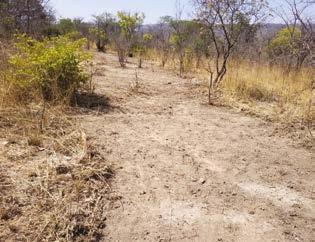
IN ZIMBABWE, 12,000M2 OF FIREGUARDS WERE CREATED
Fireguards created in Zimbabwe

BEES OF MONMOUTHSHIRE RECORDING PROJECT
UK
In an era of climate change and increasing habitat loss, it’s becoming harder for bees to find suitable nesting sites and enough of the forage they need to feed their offspring.
In 2024, the Bees of Monmouthshire Recording Project conducted 75 visits to 38 different sites across Monmouthshire. Habitats visited included ex-industrial brownfield sites, heathland in the mountain valleys, wildflower-rich hay meadows, and sandy riverbanks. The project team amassed over 900 records in 2024 and identified 122 different bee species!
On top of the fieldwork, the project involves engaging with the local community and inspiring others to take up recording and learn more about their local bee diversity. Community outreach is very important and the Bees of Monmouthshire Recording Project ran an ID workshop, gave 3 talks to local community groups, which were attended by 92 people, and lead over 71 different people on bee walks around Monmouthshire.
TREE PLANTING
Beekeepers around the world are combating the effects of climate change by planting trees to increase shade in apiaries, restoring local flora and protecting natural habitats to provide bee forage.
Trees planted by Bees for Development partners in 2024:
Ghana
3,550 trees planted in 14 communities
Ethiopia
20,700 indigenous seedlings on 14 hectares of degraded land
Zimbabwe
3,000 seedlings planted — 2,000 in disturbed areas and 1,000 in living fireguards.
Species planted include:
Anacardium occidentale
Azanza garckeana
Brachystegia spp.
Dialium guineense
Eucalyptus spp.
Julbernardia spp.
Khaya spp.
Moringa oleifera
Piliostigma thonningii
Parkia biglobosa
Rauvolfia caffra
Syzygium cordatum
Tetrapleura tetraptera
Vitellaria paradoxa
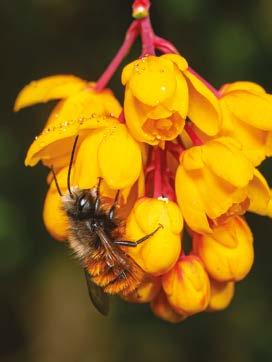
Tree planting in Afram Plains, Ghana
Male Osmia cornuta (Orchard mason bee) on a Berberis darwinii, UK
OUR IMPACT
ROUTES TO MARKET
We continue to work closely with the beekeepers we train, also facilitating market access. In Ghana we have established a honey buying enterprise and in Ethiopia, connected beekeepers to new buyers.
At the heart of this is honey traceability. This ensures transparency, accountability, and fair pricing, allowing both beekeepers and buyers to trust the integrity of the supply chain. This means that honey is not only sold at a fair price but is also recognised for its quality and origin.
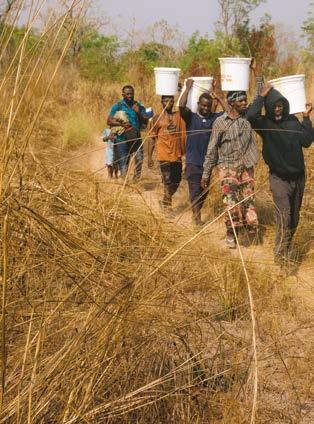
TRACEABILITY SYSTEM
Ghana and Ethiopia
Over the past few years we have been refining a traceability system designed to work in remote areas with no internet connection and that can give near live traceability data to honey buyers.
In use in Ghana since 2022, the system launched in Southwest Ethiopia in 2024 with 126 beekeepers registering. The system recorded that these beekeepers produced 7,871kg of honeycomb, which sold for ETB 2,127,050 (c. £12,000).
Data collected from the beekeepers is sent along with the honey to the buyers, demonstrating the provenance and quality of the product at each step of the process.
If any issues arise with the honey, the traceability system can be used to prove where the problem occurred and who might need additional training to prevent it occurring again. In addition, the data that the traceability system provides to buyers encourages more interest in their honey and better prices.
IN 2024, THE HONEY AND BEESWAX TRADE CENTRE BOUGHT 11,902KG OF HONEYCOMB — THAT’S UP 374% SINCE 2022.
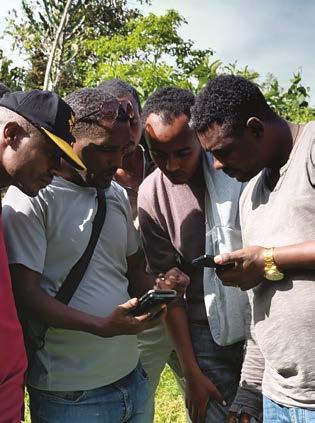
Registering beekeepers onto the traceability system — Southwest Ethiopia
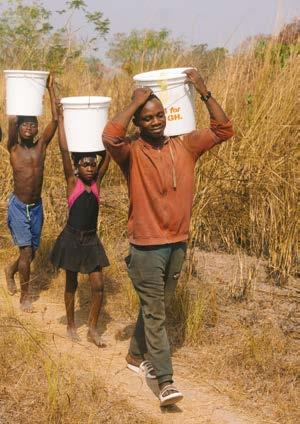
Before, I could barely sell enough to take care of my family because I did not have the required beekeeping knowledge and skill. Again, due to the level of poverty and ignorance many buyers took advantage of our situation and bought our honey for any price they so wish, leaving us with generational poverty. There was no stable price for our product. Now, the story has changed, there is reliable market and stable price, I am saving money and planning to build a better house because I earn good money from selling honeycombs.
With the Mobile Honey System, I know my honey is accounted for, and I can see the value of my work within a couple of hours after harvest.
HONEY AND BEESWAX TRADE CENTRE
Ghana
The building we started in 2022 was completed in 2024, and the Honey and Beeswax Trade Centre in Donkorkrom finally has ceilings, floors, windows, a borehole and plumbing. This incredible asset serves the local community across the Afram Plains by providing a ready market for all honey which meets the accepted quality standard.
Beekeepers are encouraged to register with the Honey and Beeswax Trade Centre, so they receive buckets at harvest time and money when they sell. Payments are made using mobile money — safer and quicker than using cash. All beekeepers are trained in quality standards and are required to adhere to the Centre’s strict traceability system — which has been designed to be as simple as possible. Whilst beekeeping training provides the ‘push’ of production, the Centre provides the ‘pull’ of the market — and for many beekeepers the ‘pull’ is all they need.
In 2024, the Honey and Beeswax Trade Centre bought 11,902kg of honeycomb and paid out GHS 297,555 (£16,065.80) to 106 beekeepers — 21 women and 85 men. Plans are underway to invest in brand development, introduce more value-added products, and develop new market outlets.


Issaka Abubakar, Beekeeper, Ghana
Labelling buckets with unique ID codes in Afram Plains, Ghana
Honey harvest in Afram Plains, Ghana
OUR IMPACT CAPACITY BUILDING
We empower beekeepers by giving them information and networking opportunities, and beekeeper trainers by giving them the tools and confidence to deliver effective training. Our Capacity Building programme reaches people 'beyond projects', and takes our impact to scale.

RESOURCE CENTRE
Global
Our online Resource Centre has 1,132 registered users and contains 2,809 articles on all aspects of beekeeping from across the globe, most of which are unique to our site. In 2024 we added four ‘How to’ manuals to the Resource Centre — How to make fixed comb beehives, How to make a top-bar hive, the Buzz Club Teachers’ Handbook and the Pollinator Training Toolkit.
We also send out the Bee Bulletin — a digest of resources for people working in beekeeping development. In 2024 the Bee Bulletin reached 1,118 readers.
Three information posters were published and distributed — Beneficial Insects, Bees of Ethiopia and How to Prevent Bushfires.
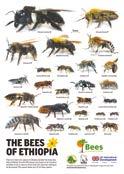
1,132 REGISTERED USERS
2,809 ARTICLES ON BEEKEEPING
1,118 BEE BULLETIN READERS
Bees for Development Ghana distributing posters on how to prevent bushfires
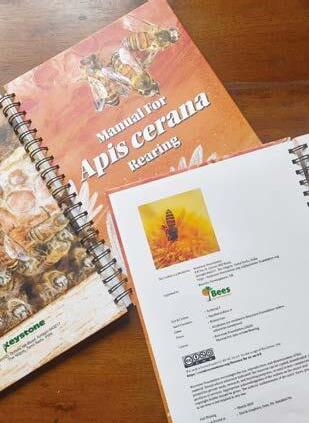
NATIONAL MALAWI HONEY SHOW
Malawi
In partnership with GiZ Malawi and Winrock International, we hosted the first National Malawi Honey Show on 7—8 November 2024. The vibrant event brought together over 70 stakeholders representing beekeeping cooperatives, associations, processors, honey buyers, NGOs, and equipment suppliers, for a trade show and two days of discussions and workshops. Through these networks, we will work towards building a strong national association.
APIS CERANA BOOKLET
Apis cerana are excellent pollinators and their honey is highly valued.
Compared to imported bees, indigenous honey bee species are more resilient to pests and diseases, are more thrifty, are better able to cope with local weather patterns and are well adapted to pollinating wild plants.
In India the native species Apis cerana is easy to keep by smallholder farmers, is gentle and low maintenance — but most beekeeping information available is about Apis mellifera and not Apis cerana. It is for this reason that in 2024 we worked with Keystone Foundation, India to produce a Manual for Apis cerana Rearing. The 60 page manual is published in English and Tamil and covers hive types, apiary set up, how to get bees, seasonal management and how to plan a beekeeping training course for farmers.
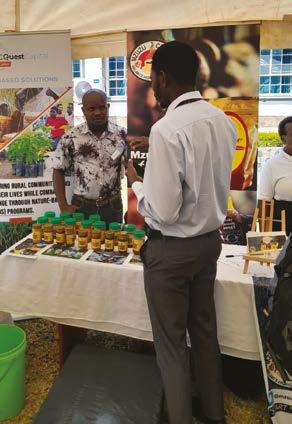
Apis cerana booklet
Beekeepers showcasing their honey at the National Malawi Honey Show
FINANCIAL REPORTS
The financial year 2023-24 was Bees for Development CIO’s first full year as a Charitable Incorporated Organisation following our transition from The Troy Trust*, a process that began in November 2022. Assets totalling £810,000 were transferred from The Troy Trust to Bees for Development CIO. Excluding these funds, the CIO raised a further £1,010,000 through donations, corporate supporters, grants, legacies, Giftaid and fundraising events.
Our expenditure on charitable activities, including direct funding of project work overseas and in the UK was £1,040,000, of which £440,000 was restricted grant funding.
We are delighted to report that at least 75p of every £1 donated directly funds our projects worldwide. We continue to implement value for money initiatives to ensure all donations are used in the very best way to make lives better with bees. Thank you to everyone who has contributed to Bees for Development, your support means so much to us.
75p OF EVERY £1 SPENT ON PROJECTS 25% ADMIN OVERHEADS
Rachael Griffiths Finance Manager
2023—2024 FINANCIAL OVERVIEW
£1.81 MILLION RAISED
£778K SPENT ON CHARITABLE ACTIVITIES
BREAKDOWN BY INCOME
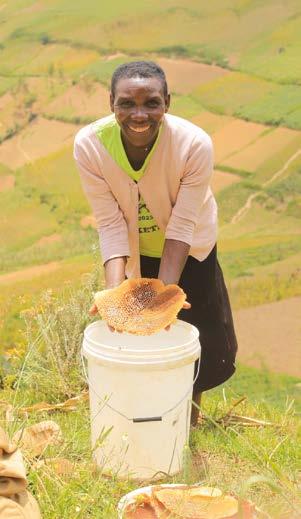
BREAKDOWN BY EXPENDITURE
Judith Nairobi, a Batwa beekeeper from Kisoro district of Uganda.
OUR PEOPLE
Bees for Development President
Her Majesty The Queen
Patrons
Monty Don
Hugh Fearnley-Whittingstall
Baroness Anita Gale
Kate Humble
Martha Kearney
Professor Tom Seeley
Sting (Gordon Sumner)
Sesi Turnbull
Trustees
Suzie Shaw, Chair
Megan Denver, Secretary
Cathy Cooper, Treasurer
Sue Brown
Loic Fossiez
Ole Hertz
Mike Krefta
Paul Smith
Gladstone Solomon
Ambassadors
Nicola Arkell Reed
Martin Fidler Jones
Alex Hirtzel
Peter Lead
Robbie Lyle
Lady Hilary Russell
Angela Sherriff
Andrew Tuggey
OUR PARTNER ORGANISATIONS
Bees for Development Ethiopia
Tilahun Gebey, Director
Getsh Kassa, Project Coordinator
Agazhe Tsegaye, Beekeeping Project Coordinator
Baye Getahun, Project Manager
Wonde Sahilemariam, Honey Marketing and Livelihood Officer
Edlegnaw Asfaw Yigzaw, Beekeeper Fieldworker
Assefa Fentya, M&E Lead
Efrem Derebie, Beekeeper Trainer
Anteneh Ayalew, Finance Lead
Melaku Tadesse Ambaw, IPM Field worker
Welelaw Ayehualem, IPM Field worker
Habtam Derebie, Cashier
The Uganda National Apiculture Development Organisation*
Dickson Biryomumaisho, Director
Phionah Birungi, Programme Manager
Hope Agwang, Inclusion Officer
Sauda Babirye, Finance Manager
Arinanye Viira, Apiary Master
Daniel Odongo, Apiary Master
Douglas Kacwinyu, Apiary Master
Keystone Foundation*, India
Pratim Roy, Director
Shiny Rehel, Biodiversity Lead
Justin Raj, Beekeeper
Working for Bees, Zimbabwe
Robert Mutisi, Director
Happle Mutisi, Accounts
Morat Mutisi, Operations
Bees for Development UK
Hannah Wood, CEO
Janet Lowore, Director of Programmes
Jenny Handley, Head of Comms and Fundraising
Rachael Griffiths, Finance Manager
Jane Barnes, Digital Comms Coordinator
Laura Grey, Comms and Fundraising Assistant
William Van Blyderveen, Project Manager
Chris Keywood, Project Manager
Ciaran Clark, Project Manager
Bees for Development North America
Megan Denver, Founder/Director
Jorik Phillips, Board Director
Professor Tom Seeley, Board Director and Patron
Bees for Development Ghana
Kwame Aidoo, Founder
Isaac Mbroh, Team Coordinator
Gideon Zege, Beekeeping Outreach and Training Manager
Amanda Ampadu, Ag Finance Manager
Esi Aidoo, Marketing Coordinator
Rejoice Azameti, Honey and Beeswax Trade Centre Supervisor
Clara Mensah, Gender and Social Inclusion Officer
Florence Sefakor Dekagbey, Monitoring and Evaluation Officer
Collaboration partners
Afram Plains Development Organisation
Ghana
Pesticide Action Network UK
Pesticide Action Nexus Ethiopia
University of Huddersfield
*These
THANK YOU
Bees for Development sincerely thank all the people and organisations who support our work.
Named here are the organisations, companies, families, beekeeping and gardening associations, charitable trusts and foundations donating towards our work, during 2024.
MAJOR DONORS
1% for the Planet
2BScientific
ADM Cares
Alex Monroe
B J Sherriff
Beechworth Honey
Bees for Development North America
Big Give
British Wax Refining Co Ltd
Buzz Club Stroud
Candid
Conwy Beekeepers Honey Fair
Crafty Ladies Hereford
Danish Beekeepers Association (Danmarks Biavlerforening)
Darwin Initiative
Didymus Charity
Draeger Medical
Eddie Dinshaw Foundation
E.H. Thorne (Beehives) Ltd.
Ethiopiaid
Euromonitor International
Flow Hive
Fortnum & Mason
Girdlers Co Charitable Trust
Healing Herbs
Hive Logic
Hobhouse Charitable Trust
Hub Cymru Africa
Hudson Valley Bee Supply
Incubeta



Jersey Overseas Aid
Jumblebee Ltd
Koster Keunen
Monmouthshire Building Society
Monmouth Town Council
Neal’s Yard Remedies
Northern Bee Books
Rowse Honey Ltd.
Smiths Group Plc
Souter Trust
St. Marks Overseas Aid Trust
The Bee Space
The Lapwing Trust
The Lizandy Charitable Trust
The London Honey Company
The Oakdale Trust
The Waterloo Foundation
Travers Cox Foundation
Tregothnan
Tudor Trust
Unbeelievable Health
University of Huddersfield
VITA (Europe) Ltd
WCVA
Welsh Government
Wikiloc
Wye Media
Wye Valley National Landscape
Yasaeng Beekeeping Supplies












Bees for Development, 1 Angel Court, St Mary’s Street, Monmouth NP25 3DB
Charity registration number: 1198116
01600 614 382 | info@beesfordevelopment.org | beesfordevelopment.org @beesfordevelopment
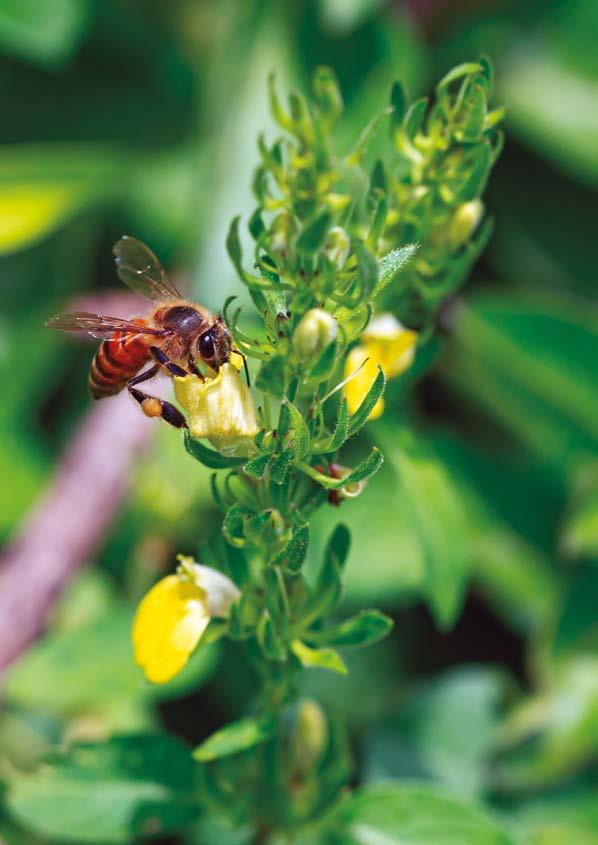
Please donate to Bees for Development and help us to Make Life Better With Bees.
£5 A MONTH
Helps us teach beekeeping skills to young people in schools.
£10 A MONTH
Helps us to plant trees to restore forests and provide nectar for bees.
£20 A MONTH
Helps us to train one person for a whole year, so that beekeeping can be a sustainable livelihood.
£50 A MONTH
Provides educational resources for a beekeeping trainer.

GIFTS IN WILLS
A gift can be left by writing a Will or amending an existing one. Anyone can leave a gift to charity in their Will. Please visit our website to follow the easy steps.
Just think — gifting a small percentage of your estate could change people’s lives long into the future — with a little help from honey bees! www.beesfordevelopment.org/ bee-involved/leave-a-legacy

Honey bee collecting pollen near Bahir Dar, Ethiopia
